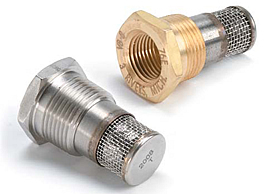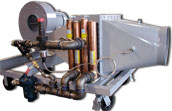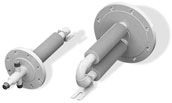Vacuum Breakers
Kadant Johnson vacuum breakers provide a simple, dependable way to relieve unwanted vacuum which may develop in a closed vessel or pipeline. They can be used to prevent contamination from back siphonage in fluid handling systems, and to protect equipment against collapse or implosion. They combine tight closing with instant response, provide large air venting capacity, and are designed for easy installation and long service life.
Positive Closing, Low Breakaway
The successful combination of the spring action on a round ball and the soft resilient seat assures positive bubble-tight closing, even at very low differential pressures. And, of course, the higher the pressure the tighter the seal. Since only slight spring pressure is needed for seating, the ball comes off the soft seat at a very low vacuum condition, providing almost instantaneous protection.
Sealing is accomplished by an EPR O-ring. The supporting seat, however, is designed to assume any pressure in excess of the small amount needed for sealing, thus preventing any excessive compression of the O-ring.
Quiet, Trouble-Free Operation
The soft resilient seat, combined with the gentle spring action, provides quiet opening and closing; chatter is completely eliminated. Corrosion-resistant seating surfaces leave little danger of any sticking or leaking. The simple design assures long and dependable service life, as proven both in the laboratory and in the field.
Easily installed, easily maintained
Kadant Johnson vacuum breakers have hex heads and standard NPT pipe threads, and are simply threaded into pipe fittings or available tank openings. Outlets can be threaded if desired.
Rigorously Tested
In exhaustive endurance tests Kadant Johnson vacuum breakers have been subjected to 120 psig (8 bar) of steam and then vacuum, four times a minute, and still opened freely and closed bubble-tight after a million such test cycles.
High Pressure and Temperature
Kadant Johnson vacuum breakers are rated for use with pressures up to 300 psig (20 bar) and temperatures up to 365° F (185° C). Higher operating pressures are possible, depending upon size, seal materials, and temperatures.






